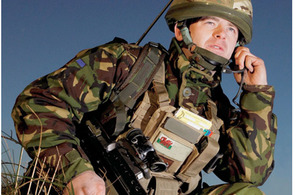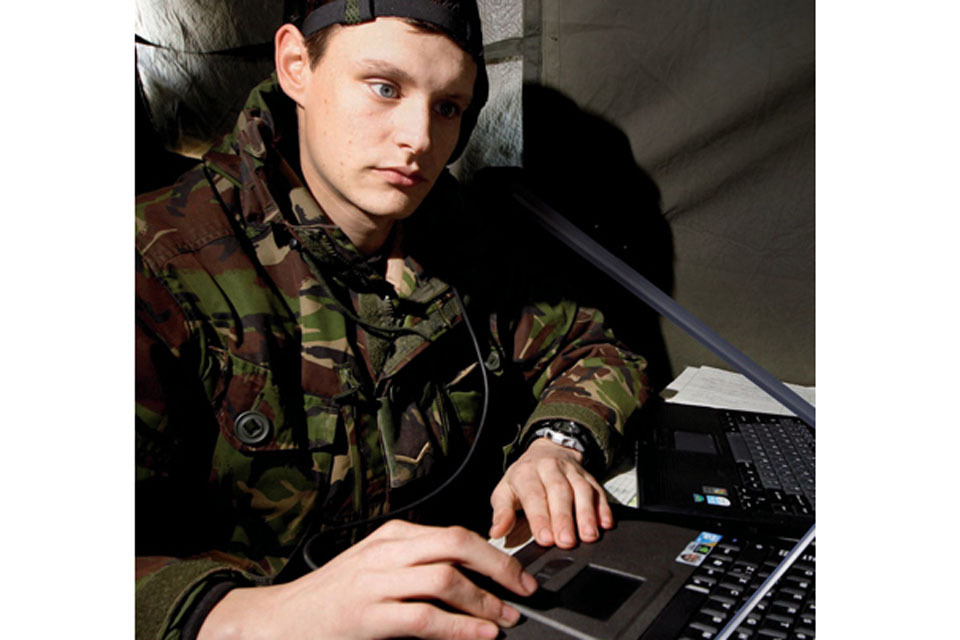Army signallers listen in on Taliban
Armed with receivers, satellite communications and other systems, 14 Signal Regiment serve as the finely-tuned ears of the British Army.

A soldier using a headset to communicate with his colleagues [Picture: Graeme Main, Crown Copyright/MOD 2012]
Faced with an enemy that works in the shadows of Afghanistan’s innocent population, it is essential for the British Army to pre-empt lethal attacks.
While varied intelligence-gathering is nothing new to Helmand province, evolving technological capabilities on both sides of the fight mean that ‘electronic warfare’ is becoming an increasingly significant term.
By listening in on insurgents, the International Security Assistance Force gathers information on when, why and how the Taliban plans to make its moves.
Corporal Darren Fowler, who works as a communications systems operator with 223 Signal Squadron, part of 14 Signal Regiment, said:
Our role is to collect intelligence within theatre. With our state-of-the-art equipment we can monitor messages to find insurgents’ tactical procedures.
Corporal Fowler will form part of the Op HERRICK 16 contingent running new specialist ‘manpacks’ which enable operators to tap into communications in real time.
Details of this technology are classified but such vital work has seen 14 Signal Regiment represented on each UK mission since the Falklands War.
Out on the battlefield, unit members are split into light electronic warfare teams of up to four members. Systems operator Corporal Morgan Scott said:
The groups are out and about in the area of operations, directed by the brigade commander in accordance with his or her priorities. We can collect intelligence that helps us understand what is happening in a certain location.

A signaller co-ordinating communications [Picture: Graeme Main, Crown Copyright/MOD 2012]
Corporal Fowler added:
When we first go in, infantry guys are not too sure about having us with them, but after giving threat warnings and providing the good news, they begin to love us. We basically become part of the infantry - we live in the base and are members of the team.
Each cluster of the specialists includes a systems operator, an Intelligence Corps analyst and a communications expert. All members can work in each other’s role and, thanks to evolving technology, their analyses are proving more precise than ever before:
Equipment is increasingly computer-based with new software that has made us more accurate and useful for the commanders on the ground,” Corporal Fowler said.
If we can get the grid quickly it means insurgents have much less of a chance to move on.
While training on Exercise Dragon’s Talon, Lance Corporal Tom Scales, 237 Signal Squadron (Electronic Warfare), outlined the kind of information his unit can obtain:
We find out as much about the enemy as possible - where they work, who they work for and where the areas of resupply are,” the serviceman explained.
By tapping into the insurgents’ communications network and using linguistics experts from the Intelligence Corps, light electronic warfare teams can work out why villagers might be supporting the Taliban.
Using equipment acquired as an urgent operational requirement, the signallers are braced to inform their infantry counterparts of potential attacks. At a time when the Army is reducing in size, 14 Signal Regiment is one of the few units set to expand in the wake of the Strategic Defence and Security Review.
Between now and 2013 it will grow by eight per cent to around 750 personnel. Major Paul Buck, Second-in-Command of 14 Signal Regiment, said:
In this tough climate, if you are a bright bloke with a bit about you then this is the place to succeed. Those with an inquiring mind and keen for a challenge are the sort of people we are looking for.
Personnel in this unit will provide key intelligence to the Army until the end of combat operations in Afghanistan and the union of their sharp intellect and technology is set to give them the edge over the enemy at every stage of that electronic journey.